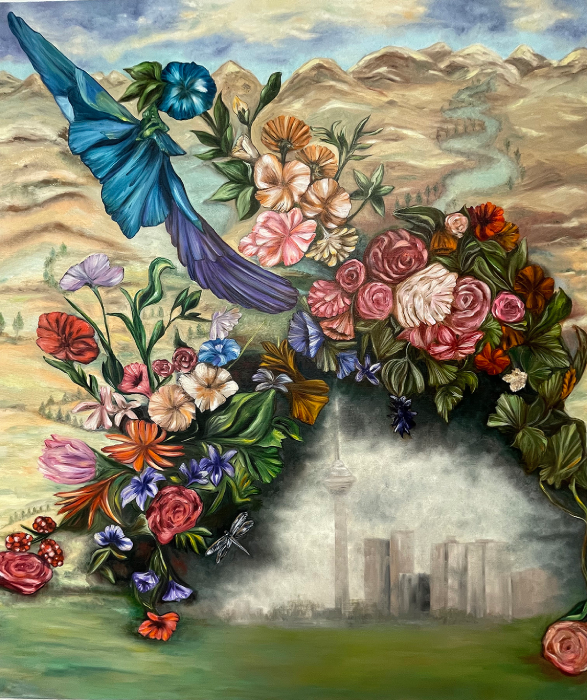Flash Nonfiction
by Magdalena Olszanowski

My son and I dip our summer legs in the shallow end of Parc Jarry's swimming pool. Impatient feet speed up around us, ready to jump into the water. School has begun, but the heat wave has given Montréal another weekend of outdoor pool openings.
A pair of children tease each other in French, poking each other’s limbs. I understand enough elementary vocabulary to know they’re joking but not enough to grasp the nuances of their language.
My imagination is not theirs, and understanding is not mine to take.
My son says hello to them as he approaches and tucks in under my armpit. They respond in a linguistic velocity that I can’t keep pace with despite their welcoming tone.
I look over.
“Oh, you know them?”
“Ouais, they’re in another class, but we play together in service de garde,” my son explains in Frenglish, as he leaps into the pool after them.
Service de garde autocorrects in my writing program to service de garden, which, often with automatic translation, turns language poetic and absurd.
A garden of service I am not privy to as: a parent, a Polish immigrant, an English speaker, an Allophone. In her memoir, We, the Others: Allophones, Immigrants, and Belonging in Canada (2022), Toula Drimonis reminds me that the term allophone comes from Greek: állos, ‘other’ and phōnē, ‘voice, sound.’ In linguistics, it refers to the possible spoken variations of particular sounds in pronouncing a language. My children come from Greek too, with names difficult to pronounce for untrained tongues. They are the possibilities of their parents’ Otherness.
In Canada, an allophone signifies a person whose first language is neither English nor French. Yet, when I grew up in Toronto, among us scrappy first-generation kids, I had never heard the term. Only upon moving to Montréal — the birthplace of my two children — did this identity become obtruded. Quebec’s aptitude for alienation with its thick margin lines, like a leaking Sharpie, welcomed me.
Yet, it’s in the marginalia of Quebec I find my voice. My mother tongue and English make way for French to fulfill my experience as an Allophone mother.
“Allô!” I’m on the phone with my son’s teacher to discuss his progress.
There’s no Google Translate between us in real time like on email, just our mouths, making do with unrecognizable words and sounds.
I yearn to understand everything the teacher says, but I can’t. I compress the receiver against my ear — as if the increase in decibels will increase my understanding.
I keep having to cut off his smooth and elegant voice.
“Lentement, s'il te plaît,” my accent drags like a boot across a salty winter sidewalk.
We decide to meet in person. I live differently in French: When speaking the language, I tense up, staying in the infinite present without a past or future (tense).
I wriggle my tongue under my mask to pronounce the letters in French. I mistake useless (vaine) for twenty (vingt) in reference to my son’s vocabulary and we erupt in a peal of laughter. I finally understand that my son is thriving in French, and my assimilation anxiety — the modus operandi of immigrants — is assuaged.
My tongue may betray what I mean, but my mother tongue also propels me across linguistic worlds and gifts me galicyzmy, words in Polish that sound and mean the same thing in French. As a parent, some of these cognates live on the tip of my tongue: le cauchemar, l’écran, le parasol. These words are the tender glances from a prospective lover at a party, or the way my son smiles at me while he cannonballs into the pool, accepting I prefer to watch him and sit on the edge. These glances provide a nurtured understanding, an acceptance of the limits of each other’s capacities — to splash, to touch, to speak — in a shared language rather than the expectation of something to be different in the future. They’re not prescriptive, and they can’t be automatically translated either. My impatience of not grasping French fast enough reminds me of children at the gates of a pool, tugging at the lock chains and each other; it will open when the conditions are right. It takes a while to understand that though. It took me a decade of living in Montréal to know that words are willing to jump for whatever I need — if I’m willing to join them.
Appeared in Issue Fall '24
Nationality: Polish, Canadian
First Language(s): Polish
Second Language(s):
English,
French
Stadt Graz Kultur

Listen to Magdalena Olszanowski reading "A Mother’s Tongue Across Linguistic Worlds":
Supported by:


Comments on "A Mother’s Tongue Across Linguistic Worlds"
Please log in to submit a comment.
Login